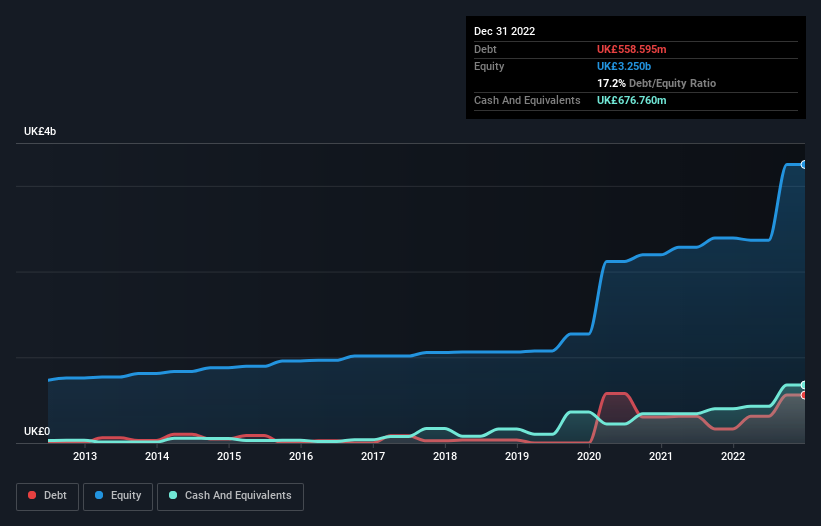- United Kingdom
- /
- Consumer Durables
- /
- LSE:VTY
These 4 Measures Indicate That Vistry Group (LON:VTY) Is Using Debt Reasonably Well
The external fund manager backed by Berkshire Hathaway's Charlie Munger, Li Lu, makes no bones about it when he says 'The biggest investment risk is not the volatility of prices, but whether you will suffer a permanent loss of capital.' So it seems the smart money knows that debt - which is usually involved in bankruptcies - is a very important factor, when you assess how risky a company is. We note that Vistry Group PLC (LON:VTY) does have debt on its balance sheet. But should shareholders be worried about its use of debt?
When Is Debt A Problem?
Generally speaking, debt only becomes a real problem when a company can't easily pay it off, either by raising capital or with its own cash flow. In the worst case scenario, a company can go bankrupt if it cannot pay its creditors. However, a more frequent (but still costly) occurrence is where a company must issue shares at bargain-basement prices, permanently diluting shareholders, just to shore up its balance sheet. Of course, the upside of debt is that it often represents cheap capital, especially when it replaces dilution in a company with the ability to reinvest at high rates of return. When we think about a company's use of debt, we first look at cash and debt together.
View our latest analysis for Vistry Group
What Is Vistry Group's Debt?
As you can see below, at the end of December 2022, Vistry Group had UK£558.6m of debt, up from UK£164.3m a year ago. Click the image for more detail. However, it does have UK£676.8m in cash offsetting this, leading to net cash of UK£118.2m.

A Look At Vistry Group's Liabilities
Zooming in on the latest balance sheet data, we can see that Vistry Group had liabilities of UK£1.57b due within 12 months and liabilities of UK£1.20b due beyond that. Offsetting this, it had UK£676.8m in cash and UK£445.9m in receivables that were due within 12 months. So its liabilities outweigh the sum of its cash and (near-term) receivables by UK£1.64b.
This deficit is considerable relative to its market capitalization of UK£2.57b, so it does suggest shareholders should keep an eye on Vistry Group's use of debt. This suggests shareholders would be heavily diluted if the company needed to shore up its balance sheet in a hurry. While it does have liabilities worth noting, Vistry Group also has more cash than debt, so we're pretty confident it can manage its debt safely.
Also positive, Vistry Group grew its EBIT by 23% in the last year, and that should make it easier to pay down debt, going forward. The balance sheet is clearly the area to focus on when you are analysing debt. But it is future earnings, more than anything, that will determine Vistry Group's ability to maintain a healthy balance sheet going forward. So if you want to see what the professionals think, you might find this free report on analyst profit forecasts to be interesting.
Finally, while the tax-man may adore accounting profits, lenders only accept cold hard cash. Vistry Group may have net cash on the balance sheet, but it is still interesting to look at how well the business converts its earnings before interest and tax (EBIT) to free cash flow, because that will influence both its need for, and its capacity to manage debt. During the last three years, Vistry Group produced sturdy free cash flow equating to 63% of its EBIT, about what we'd expect. This free cash flow puts the company in a good position to pay down debt, when appropriate.
Summing Up
While Vistry Group does have more liabilities than liquid assets, it also has net cash of UK£118.2m. And we liked the look of last year's 23% year-on-year EBIT growth. So we are not troubled with Vistry Group's debt use. The balance sheet is clearly the area to focus on when you are analysing debt. But ultimately, every company can contain risks that exist outside of the balance sheet. To that end, you should learn about the 3 warning signs we've spotted with Vistry Group (including 1 which is significant) .
Of course, if you're the type of investor who prefers buying stocks without the burden of debt, then don't hesitate to discover our exclusive list of net cash growth stocks, today.
New: Manage All Your Stock Portfolios in One Place
We've created the ultimate portfolio companion for stock investors, and it's free.
• Connect an unlimited number of Portfolios and see your total in one currency
• Be alerted to new Warning Signs or Risks via email or mobile
• Track the Fair Value of your stocks
Have feedback on this article? Concerned about the content? Get in touch with us directly. Alternatively, email editorial-team (at) simplywallst.com.
This article by Simply Wall St is general in nature. We provide commentary based on historical data and analyst forecasts only using an unbiased methodology and our articles are not intended to be financial advice. It does not constitute a recommendation to buy or sell any stock, and does not take account of your objectives, or your financial situation. We aim to bring you long-term focused analysis driven by fundamental data. Note that our analysis may not factor in the latest price-sensitive company announcements or qualitative material. Simply Wall St has no position in any stocks mentioned.
About LSE:VTY
Flawless balance sheet with reasonable growth potential.
Similar Companies
Market Insights
Community Narratives



